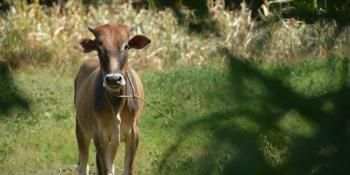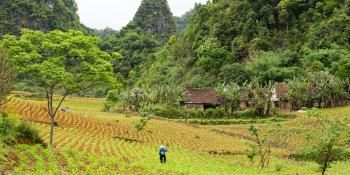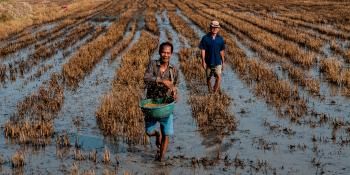Commission on Sustainable Agriculture and Climate Change informs diverse policy processes

Summary
The research was led by the CCAFS Coordinating Unit.
How will we achieve food security as climate change approaches? To help answer this fundamental question, CCAFS convened the Commission on Sustainable Agriculture and Climate Change, with support from the Global Donor Platform for Rural Development. The Commission, consisting of thirteen senior scientists from diverse academic and institutional backgrounds, set out to provide an independent, interdisciplinary, and evidence-based assessment to be used by policymakers for addressing food security in the face of climate change.
In March 2012, the Commission released its final report, titled ‘Achieving Food Security in the Face of Climate Change’. Based on a review of the scientific evidence identifying a pathway towards food security in the context of climate change, the report highlights the need for food systems to shift to better serve human needs, in balance with the earth’s resources in the long-term. The report received widespread coverage in the international media, including BBC, the New York Times, Reuters, Time and Nature. In addition, the Commission’s recommendations set the framework for Agriculture Day at Rio+20, with three ministers from Brazil among the speakers and panellists.
The Commission’s recommendations have also had an impact on policy dialogue in several countries, as well as the UN. In Mexico, the report was used to support a draft climate change bill, which was later passed as the world’s third climate change law. In Bangladesh, the report was used to strengthen the country’s UNFCCC submission on agriculture. In Kenya, the report was used as a reference in preparation of the country’s agriculture act. The UN Committee on Food Security used the report in its recommendations concerning climate change and food security. As policies relating to climate change and mitigation are at an early stage in many countries, the report has been important for mobilizing both thinking and action.
Key facts
- The Commission highlights the need for divergence from ‘business as usual’ in food systems, to bring food security and environmental sustainability.
- The Commission’s recommendations informed agricultural policy in Mexico, Bangladesh, Kenya and the food security recommendations of the UN Committee on Food Security.
Lessons: key elements of success
- Through its interdisciplinary approach, the Commission was able to identify the most important ways for governments, researchers, food companies, farmers and investors to tackle global food security and climate stabilization.
- The Commission’s findings were shared widely through targeted engagement and communications activities that made the issues approachable. An animated video helped bringing key issues to a broad audience. The result was extensive media coverage and more than 50,000 total downloads of the summary and final reports in four languages.
Further reading
- Commission on Sustainable Agriculture and Climate Change
- Final report from the Commission on Sustainable Agriculture and Climate Change
- Video: How to feed the world in 2050: actions in a changing climate
Related research outputs
- Beddington JR, Asaduzzaman M, Clark ME, Fernández Bremauntz A, Guillou MD, Howlett DJB, Jahn MM, Lin E, Mamo T, Negra C, Nobre CA, Scholes RJ, Van Bo N, Wakhungu J. 2012. What Next for Agriculture After Durban? Science, 335: 289-290.
- Beddington JR, Asaduzzaman M, Clark ME, Fernández Bremauntz A, Guillou MD, Jahn MM, Lin E, Mamo T, Negra C, Nobre CA, Scholes RJ, Sharma R, Van Bo N, Wakhungu J. 2012. The role for scientists in tackling food insecurity and climate change. Agriculture and Food Security, 1:10.


